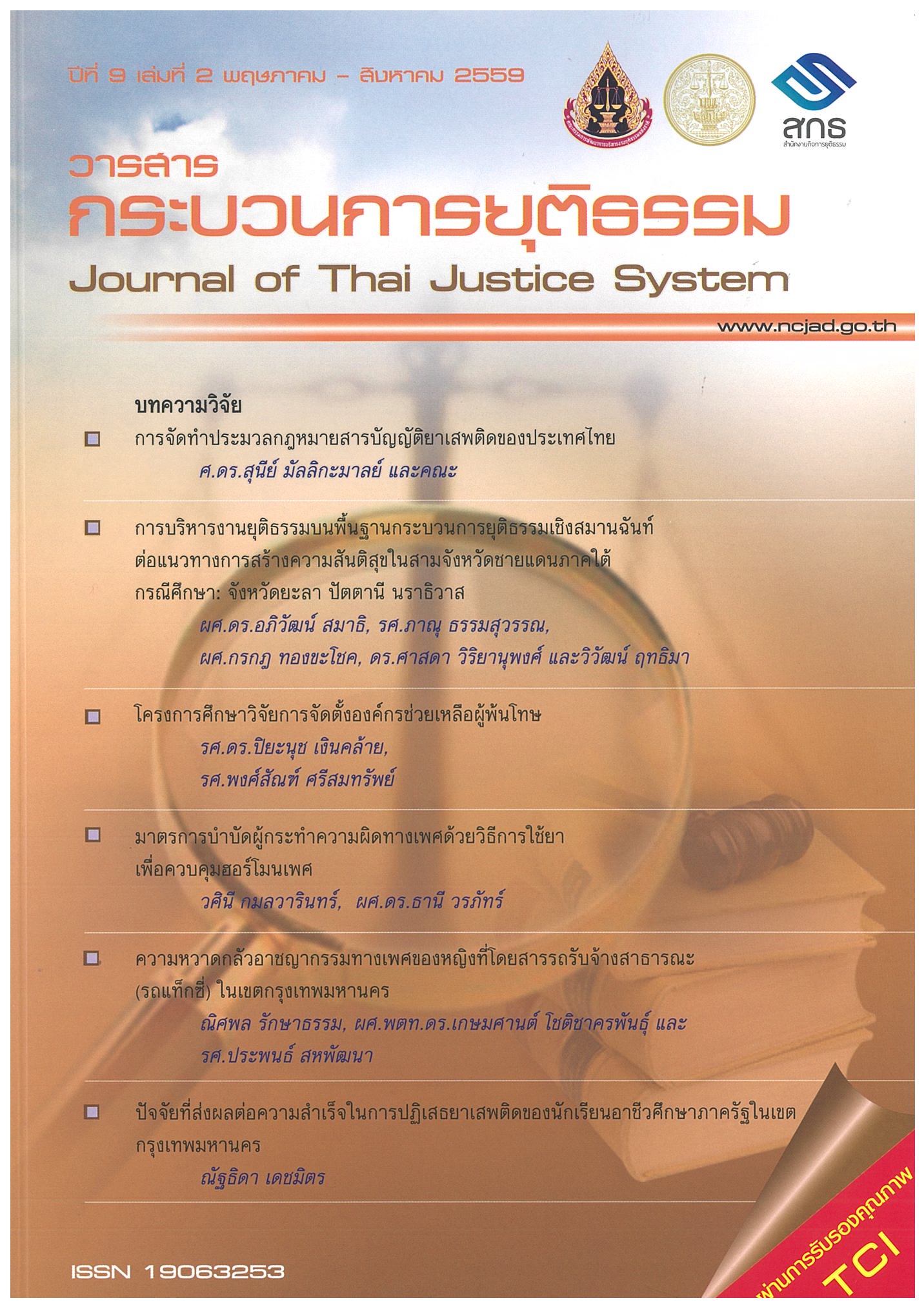การบริหารงานยุติธรรมบนพื้นฐานกระบวนการยุติธรรมเชิงสมานฉันท์ต่อแนวทางการสร้างความสันติสุขในสามจังหวัดชายแดนภาคใต้ กรณีศึกษา : จังหวัดยะลา ปัตตานี และนราธิวาส
Main Article Content
บทคัดย่อ
งานวิจัยนี้มีวัตถุประสงค์เพื่อศึกษา 1) เพื่อศึกษาระดับความรู้ความเข้าใจของประชาชนต่อการบริหารงานยุติธรรมบนพื้นฐาน กระบวนการยุติธรรม เชิงสมานฉันท์ในสามจังหวัดชายแดนภาคใต้ 2) เพื่อศึกษาทัศนะของประชาชนต่อการบริหารงานยุติธรรมบนพื้นฐานกระบวนการยุติธรรมเชิงสมานฉันท์ตามแผนยุทธศาสตร์และเพื่อสร้างความสันติสุขในสามจังหวัดชายแดนภาคใต้ และ 3) เพื่อศึกษาแนวทางการนำกระบวนการยุติธรรมเชิงสมานฉันท์ที่มีความเหมาะสมมาใช้ควบคู่กับการบริหารงานยุติธรรมหลักในสามจังหวัดชายแดนภาคใต้ วิธีการดำเนินการรวิจัยประกอบด้วย (1) ศึกษาเอกสารและงานวิจัยที่เกี่ยวข้องเพื่อนำมาวิเคราะห์และสังเคราะห์ข้อมูล (2) ดำเนินการเก็บข้อมูลจากกลุ่มตัวอย่าง 3 วิธี คือ 1) เก็บแบบสอบถามจากกลุ่มตัวอย่างที่เป็นข้าราชการสายงานยุติธรรม (ตำรวจ, อัยการ, ศาล, ราชทัณฑ์ และประชาชนในพื้นที่ สามจังหวัดชายแดนภาคใต้ คือ จังหวัดยะลา เก็บข้อมูลจากอำเภอเมืองยะลางยะลา และอำเภอยะหา จังหวัดปัตตานี เก้บข้อมูลจากเภอเมืองปัตตานีและอำเภอระยัง จังหวัดนราธิวาสเก้บข้อมูลจากอำเภอเมือง และอำเภอสไหงปาดี โดยเก็บข้อมูลตามแนวทางการกระจายน้่ำหนักของกลุ่มตัวอย่างในแต่ละอำเภอตามหลักการทางสถิติรวมทั้งสิ้น 1,200 ราย โดยแบ่งเป็นการเก้บแบบสอบถาม จากประชาชน 900 ราย และจากข้าราชการ 300 ราย (โดยแบ่งเก็บจังหวัดละ 400 ราย คือประชาชนจำนวน 300 ราย และข้าราชการฯ จำนวน 100 รายตามลำดับ) 2) เก็บแบบสัมภาษณ์เพื่อเป็นการเก็บข้อมูลเชิงลึกโดยการสัมภาษณ์เพื่อเป็นการเก้บข้อมูลเชิงลึกโดยการสัมภาษณ์กลุ่มตัวอย่างข้าราชการสายงานยุติธรรมและประชาชนในพื้นที่วิจัย จำนวน 20 ราย แบ่งออกเป็นข้าราชการตำรวจ 5 ราย ข้าราชการอัยการ 2 ราย ผู้พิพากษา 3 ราย ราชทัณฑ์ 3 ราย และประชาชน, ผู้นำชุมชน 7 ราย 3. จัดเวทีเสวนาระดมความคิดเห็นของประชาชนต่อแนวทางแก้ไขปัญหาความขัดแย้งในสามจังหวัดชายแดน จำนวน 40 ราย 3) นำผลข้อมูลที่ได้จากการเก็บแบบสอบถาม, การสัมภาษณ์ และการจัดเวทีเสวนาระดมความเห็นของประชาชน วิเคราะห์ เพื่อหาค่าเฉลี่ย, สัดส่วนร้อยละและทดสอบสมมุติฐายที่ได้กำหนดไว้ (4) นำผลการวิจัยมาวิเคราะห์ร่วมกับเอกสารงานวิจัยที่ได้ศึกษามา และเขียรายงานการวิจัยเพื่อเสนอเป็นลำดับต่อไป
ผลการจากการดำเนินการวิจัยพบว่า 1)จากการประเมินระดับความรู้ความเข้าใจด้านการบริหารงานยุติธรรมบนพื้นฐานกระบวนการยุติธรรมเชิงสมานฉันท์ของข้าราชการและประชาชนในสามจังหวัดชายแดนภาคใต้ พบว่า ไม่มีความรู้ความเข้าใจด้านการบริหารงานยุติธรรมบนพื้นฐานกระบวนการยุติธรรมเชิงสมานฉันท์ คิดเป็นร้อยละ 60 จากจำนวนทั้งหมด และจากการเปรียบเทียบพบว่าประชาชนมีความรู้ความเข้าใจด้านการบริหารงานยุติธรรมบนพื้นฐานกระบวนการยุติธรรมเชิงสมานฉันท์น้อยกว่าข้าราชการฯ 2) จากการศึกษาทัศนะต่อการบริหารงานยุติธรรมบนพื้นฐานกระบวนการยุติธรรมเชิงสมานฉันท์ตามแผนยุทธศาสตร์ที่เน้นการอำนวยความยุติธรรมตามกรอบทัศนะการคุ้มครองสิทธิขั้นพื้นฐานของประชาชน (due process model) เต็มรูปแบบลำดับรองลงมาคือ ยุทธศาสตร์ด้านการเร่งจัดตั้งคณะกรรมการสอดส่องดูแลการดำเนินกระบวนการยุติธรรมตามหลักนิติธรรมในพื้นที่ 3 จังหวัดชายแดนภาคใต้เพื่อประสานงานและให้่มีการแก้ไขข้อขัดข้องในกระบวนการยุติธรรม (4.22) และ 3) จากการศึกษาทัศนะต่อการบริหารงานยุติธรรมบนพื้นฐานกระบวนการยุติธรรมเชิงสมานฉันท์ต่อแนวทางการสร้างความสันติสุขในจังหวัดชายแดนภาคใต้ พบว่า แนวทางการสร้างความสันติสุขที่ประชาชนเห็นด้วยมากที่สุด คือ การนำกระบวนการยุติธรรมเชิงสมานฉันท์มาใช้ในการแก้ไขปัญหา ความไม่สงบในสามจังหวัดชายแดด (4.13) ลำดับรองลงมาคือ เห็นด้วยต่อการให้ผู้นำทางศาสนาและผู้นำชุมชนและประชาชนเข้ามาเป็นส่วนร่วมในการแก้ไขปัญหาความขัดแย้งในพื้นที่ (3.87) ข้อเสนอแนะจากการวิจัย 1. กระบวนการยุติธรรมเชิงสมานฉันท์ตามแผนยุทธศาสตร์ของกระทรวงยุติธรรมถือเป็นนโยบายที่มีความสำคัญต่อการนำมาใช้แก้ไขปัญหาความขัดแย้งในพื้นที่ แต่ต้องเป็นการดำเนินการทั้งในส่วนของกระบวนการยุติธรรมหลักและกระบวการยุติธรรมเชิงสมานฉันท์ควบคู่กันไป
2.ในปัจจุบันปัญหากระบวนการยุติธรรมในสามจังหวัดชายแดนภาคใต้ คือ การไม่มีใครกล้ามาเป็นพยานในคดีความมั่นคงทำให้น้ำหนักพยานหลักฐานลดน้อยลงและไม่สามารถชี้ตัวผู้กระทำผิดมาลงโทษได้เพราะกลัวด้านความปลอดภัยในชีวิตและทรัพย์สินของตนเองและครอบครัว 3. ประชาชนส่วนใหญ่ไม่เห็นด้วยกับ พรบ. มั่นคง มาตราที่ 21 หากเป็นกรณีการฆ่าผุ้บริสุทธิ์หรือการทำร้ายเจ้าหน้าที่ของรัฐ และไม่มีสิ่งใดมายืนยันว่าผู้กระทำผิดจะไม่หวนกลับไปก่อคดีอีก แต่หากเป็นการก่อคดีที่ยังไม่ถึงขั้นฆ่าคนตาย เช่น ผู้ดูต้นทาง, วางตะปูเรือใบ, เผากล้องวงจรผิด ฯลฯ สามารถนำผู้กระทำความผิดเหล่านี้ เข้าสู่กระบวนการของ พรบ.มั่นคง ตามมาตราที่ 21 ได้
Article Details
ต้นฉบับที่ได้รับการตีพิมพ์ในวารสาร เป็นลิขสิทธิ์ของวารสารกระบวนการยุติธรรม แต่ความคิดเห็นที่ปรากฏในเนื้อหาของบทความในวารสารกระบวนการยุติธรรม ถือเป็นความรับผิดชอบของผู้เขียนแต่เพียงผู้เดียว
เอกสารอ้างอิง
จุฑารัตน์ เอื้ออำนวย. (ผ2548) "กระบวนการยุติธรรมเชิงสมานฉันท์ การปรับกระบวนทัศน์ กระบวนการยุติธรรมไทย". วิทยานิพนธ์ดุษฎีบัณฑิต สาขาวิชาสหวิทยาการคณะบัณฑิตวิทยาลัยมหาวิทยาลัยธรรมศาสตร์
นิติธร วงศ์ยืน, (2548). "กระบวนการยุติธรรมเชิงสมานฉันท์ด้วยวิธีกลุ่มครอบครัว", ดุลพาหกันยายน-ธันวาคม 2548
อคิน รพีพัฒน์ ,ม.ร.ว. (2527). "การมีส่วนร่วมของชุมชนในการพัมนา". ทวีทอง หงษ์วิวัฒน์ (บรรณาธิการ) กรุงเทพฯ:ศักดิ์โสภาการพิมพ์.
อานันท์ ปันยารชุน (2548), การดำเนินกระบวนการยุติธรรมใน 3 จังหวัดชายแดนภาคใต้-ปัญหาและแนวทางแก้ไข, บทความหนังสือพิมพ์ประชาไท เมื่อวันที่ 25 สิงหาคม 2548
อภิวัฒน์ สมาธิ, (2554) "การดำเนินนโยบายของรัฐภายใต้การบังคับใช้กฎอัยการศึกในสามจังหวัดชายแดน ภาคใต้", ดุษฎีนิพนธ์สาขารัฐประศาสนศาสตร์ มหาวิทยาลัย อิสเทิร์นเอเชีย
อภิวัฒน์ สมาธิ, (2556) "การบริหารงานยุติธรรมภายใต้การบังคับใช้กฎอัยกายศึกและพระราชกำหนดการบริหารราชการในสถานการณ์ฉุกเฉินเพื่อแก้ไขปัญหาความขัดแย้งในจังหวัดชายแดนใต้", งบวิจัยสำนักงานตำรวจแห่งชาติ (ภจว.สข)


